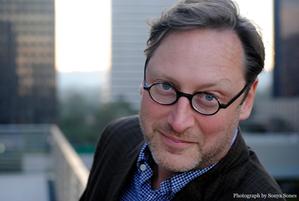
|
|
| M.T. Anderson (photo: Sonya Sones) |
|
M.T. Anderson is the author of Feed, winner of the Los Angeles Times Book Prize; the National Book Award–winning The Astonishing Life of Octavian Nothing and its sequel, The Kingdom on the Waves; Symphony for the City of the Dead: Dmitri Shostakovich and the Siege of Leningrad; and many other books for children and young adults. He lives near Boston, Mass.
 |
|
| Eugene Yelchin (photo: Roxyanne Young) |
|
Eugene Yelchin is a Russian-American author and illustrator of many books for children, including Breaking Stalin's Nose, a Newbery Honor book; The Haunting of Falcon House, a Golden Kite Award winner; and The Rooster Prince of Breslov, a National Jewish Book Award winner. He lives in Topanga, Calif.
Candlewick will publish their collaboration The Assassination of Brangwain Spurge on September 25, 2018.
How did this book come to be?
Eugene Yelchin: I became interested in the idea of a book in which the illustrations instead of supporting the text contradicted it. What needed to be done was to tell the story from two opposing points of view: one character would deliver the narrative in the written language, while the other would do the same by using the language of illustration. Both languages would be at odds with each other. Ideally, the book would have two creators so that each would play a role of one of the two main characters. The work of M.T. Anderson had always stood out for its courage, its insatiable intellectual curiosity and its dedication to literary form. As a result, I asked Tobin to work with me on the project. To my great joy, he agreed.
M.T. Anderson: It happened over lunch. Eugene and I had met virtually, online, through shared interests. I was an admirer of his work. As we were walking out of the restaurant, he said to me that he wanted to write a book collaboratively in which the pictures, rather than illustrating the text, contradicted the text, telling a different story, or another view of the same story. We began sending e-mails about settings and plot ideas.... I started to think about all of those ancient travelers who wrote books about their journeys, describing fabulous kingdoms far away. I've always loved the weirder corners of those travelogues and have wondered what cultural misunderstandings and blindnesses might have given rise to their bizarre accounts. So we started to talk about what would happen if an uptight elfin scholar for some reason penetrated the kingdom of your traditional evil overlord to write about the culture of the goblin hordes.
Why elves and goblins?
Yelchin: High fantasy populated with elves and goblins is so deeply ingrained in our culture that both of us knew that subverting such a familiar genre would be a lot of fun. What was fascinating about developing the plot was the fact that Tobin and I had come from very different cultural backgrounds and as such we were perfectly suited to play characters with very different cultural backgrounds. In other words, Tobin and I had to overcome our individual preferences in order to find the common language, and this is exactly what the book is about.
Anderson: Initially we tried to avoid calling them "elves" because both Eugene and I hate the word "elf." (I'm a recovering fantasy addict; Eugene can't stand Tolkien.) But what we liked about using those stale old fantasy creatures is that they already come with baggage for readers. Readers would instantly have a set of stereotypes that they would apply, so they'd start the book in somewhat the same situation as our elfin emissary: believing that goblins are a faceless horde of relentless evil-doers.
What was the process of writing/illustrating this book like?
Yelchin: Tobin would write a chapter from Werfel's point of view and I would draw a chapter from Spurge's point of view, and then we would exchange the chapters. Tobin would make suggestions, and I would make suggestions, and so we kept inching forward. What made the process stimulating was the fact that our working styles were so different. I planned out my narratives meticulously in advance; all Tobin needed to begin his incredible writing was the overall direction of any particular sequence. As a result, he remains completely free and spontaneous on the page. Tobin's language never feels labored. His sentences are so alive you can feel their heartbeat.
Anderson: The story developed stage by stage. We knew the general direction but no particulars. I loved that, because we both saw opportunities we certainly never would have seen individually. We provoked each other. Both of us love Cold War spy novels, so the plot slid sharply in that direction, which gave both of us a lot of pleasure. It allowed us to play with deeper themes of betrayal and friendship.
What would you say is the most important takeaway from the book?
Anderson: Always ask who's telling the story and why they're telling it!
Yelchin: Sadly, the politics of division are about to reach a critical point in this country, as well as in many other countries in the world. This book is about overcoming opposing points of view in order to have a meaningful conversation, in order to unite us, we goblins and elves, rather than divide us. If we fail, fascism happens, totalitarian rule happens, tyranny happens. I saw all three while living in the Soviet Union and that is why I left my homeland. My hope is that our concern for the future will register with young readers.
That goblins save and treasure their shed skins while elves see the practice as disgusting felt like a really perfect example of intercultural misunderstanding. Have you ever found yourself in particularly intense culture shock?
Anderson: I went to school in England for four years when I was young and spent the first three being constantly shocked how deep cultural differences could run in two nations that share one language. Eugene, I suspect, would have an even better answer to this.
Yelchin: Coming to the United States from the Soviet Union was shocking. I will give you one silly example. James Bond movies were routinely criticized by the Soviet newspapers as ultra-violent, anti-Communist, political thrillers, but the movies themselves were never shown to the Soviet audiences. I never questioned the newspapers. When I for the first time watched a re-run of one of the old James Bond movies on TV, I was utterly shocked. The ultra-violent, anti-Communist, political thrillers turned out to be over-the-top, tongue-in-cheek adventure comedies.
But more to the point, when Tobin had the brilliant idea of goblins shedding and preserving their skins, it fascinated me. Together, we pushed his idea to its logical extreme when in the epilogue the elf is undergoing the same metamorphosis. As a metaphor, this is a complete character transformation, a reversal of one's initial belief system. This metaphor feels very personal to me as I, too, had to shed my Soviet skin in order to become an American. --Siân Gaetano, children's and YA editor, Shelf Awareness

